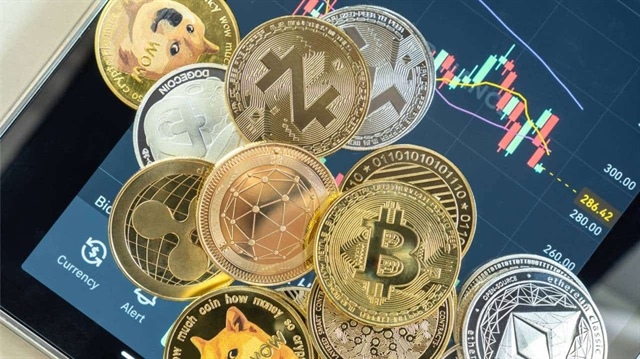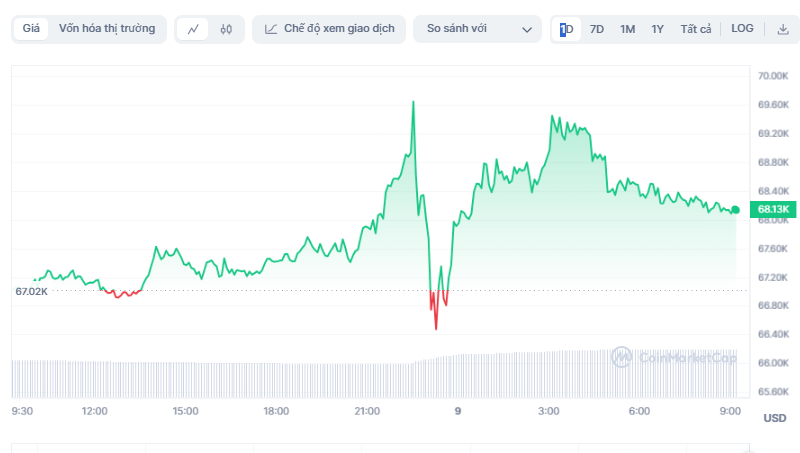While Bitcoin grabs the headlines when it comes to cryptocurrency, there are, in fact, thousands of other options in the digital currency world.
Here is a list of the biggest cryptocurrencies by total market value of coins in circulation, according to data from the website CoinMarketCap.com.
Bitcoin (BTC)
Trading at $92,015 per coin on February 25, with a market capitalization of nearly $1.825 trillion, Bitcoin is the icon of the cryptocurrency era and remains the first name that comes to mind when digital currency is mentioned.
Bitcoin launched in 2009, created by a mysterious figure – believed to be Mr. Satoshi Nakamoto – and has experienced numerous dramatic fluctuations. However, it was not until 2017 that Bitcoin truly entered the public consciousness. In 2024, the U.S. Securities and Exchange Commission (SEC) approved the trading of ETFs (a type of fund that can be traded on stock exchanges) that invest directly in Bitcoin, making it easier for investors to bet on this digital currency.
Ethereum (ETH)
As of February 25, Ethereum’s price was $2,507 USD, and its market capitalization was $302 billion.
Ethereum, the second-largest cryptocurrency platform after Bitcoin, is another easily recognizable name in the crypto field. The system allows the use of ether (the platform’s currency) to perform various functions, most notably smart contracts.
 |
Tether (USDT)
Tether traded at almost $0.999 per token on February 25, with a market cap of $142.331 billion.
Tether has a value that is pegged to $1 per coin, as it is a stablecoin. Stablecoins are a type of cryptocurrency that is pegged to a specific asset – in the case of Tether, it is the US dollar.
Tether is often used as an intermediary when traders convert between cryptocurrencies. Instead of converting to USD, they use Tether to save time and costs. However, some are concerned that Tether is not fully backed by USD reserves but instead relies on unsecured short-term debt.
XRP (XRP)
XRP traded at $2.29 on February 25, with a market cap of $132.587 billion.
Previously known as Ripple, XRP was created in 2012 and provides a payment solution for multiple real-world currencies. XRP is particularly useful for cross-border transactions, utilizing a peer-to-peer mechanism to process payments quickly and efficiently.
BNB (BNB)
BNB has a market capitalization of $87 billion and traded at $611 per token on February 25.
BNB is the cryptocurrency issued by Binance, one of the world’s largest cryptocurrency exchanges. Initially, BNB was created to pay for transaction fees at a discount on the Binance exchange. However, today, BNB is also used for payments, shopping for goods and services, and more, expanding its utility far beyond its original purpose.
Solana (SOL)
Solana traded at $140 per token, with a market cap of $69.76 billion.
Launched in March 2020, Solana is one of the newer cryptocurrencies, notable for its fast transaction processing speed. The total supply of Solana (SOL) is limited to 480 million coins.
USD Coin (USDC)
USD Coin traded at $0.9999, with a market cap of $56.54 billion.
Similar to Tether, USD Coin is a stablecoin pegged to the US dollar, maintaining a stable value over time. The founders of USDC assert that this coin is fully backed by reserve assets or equivalent collateral, held in US-regulated financial institutions.
Dogecoin (DOGE)
Dogecoin has a market cap of $31.29 billion and traded at $0.2118 on February 25.
Initially created as a joke following the Bitcoin boom, Dogecoin was inspired by the popular meme featuring the Shiba Inu dog. Unlike many other cryptocurrencies that have a limited supply, Dogecoin has an unlimited supply and can be used for payments or money transfers.
Cardano (ADA)
Cardano traded at $0.6884, with a market cap of $24.167 billion.
Developed by one of the co-founders of Ethereum, Cardano also supports smart contracts, enabling functions like decentralized identity management.
TRON (TRX)
TRON traded at $0.242 on February 25, with a market cap of $20.834 billion.
Founded in 2017, the native currency of this platform is TRX. In 2018, the TRON Foundation acquired BitTorrent, a peer-to-peer file-sharing protocol, thereby expanding the potential applications of the TRON ecosystem.
THAO VY
– 14:00 26/02/2025
The Pi Network Launch Disaster: A Third of the Price and Technical Glitches Galore
After a long and highly anticipated 6-year wait, the official listing day of the Pi Network (Pi) fell flat, disappointing millions of users. The value of the coin plummeted, and technical glitches plagued the app and website.
The Crypto-Husband: Chasing the Dream, Losing a Fortune
My husband dabbled in a few different cryptocurrencies, but they were all obscure and potentially fraudulent. To sell these cryptocurrencies, he had to invest real money into the system. Time and time again, he was scammed out of hundreds of thousands of dollars, yet he remained convinced that he could strike it rich with these digital assets.





















